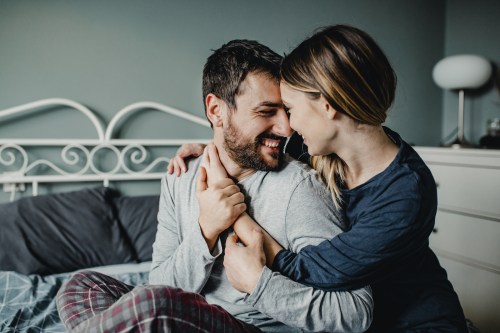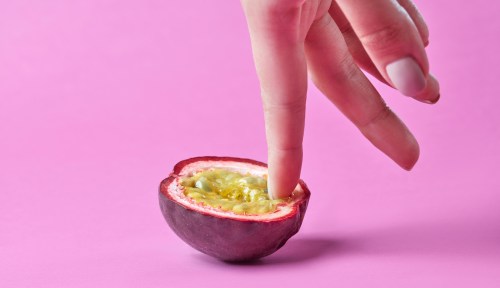What Your Sexual Attachment Style Can Tell You About Your Intimate Preferences
Your attachment style can affect many parts of your relationships, including your sex life. See what experts have to say about sexual attachment style.

I used to think that I didn’t have a type, despite my past choices displaying that I very much have a type (fitness trainer or bartender). I say I’m just attracted to people’s energy but, clearly, certain patterns have emerged. And as it turns out, there’s some truth to it, according to adult attachment theory—which breaks into three major styles: secure, anxious, and avoidant. “Attachment styles are behaviors and beliefs that you learn from the way that people in your family have relationships,” says psychotherapist Aimee Daramus, PsyD. “Your style can affect any part of your relationship, including sex.” But what can and can’t your sexual attachment style tell you about yourself and your preferences?
Experts in This Article
First, a quick breakdown of attachment styles, which tend to form in childhood: People with a secure attachment style are comfortable giving and receiving love, and they tend to deal with their emotions in a healthy way. Anxiously attached people need a lot of reassurance from their partners, otherwise, they do things like text their partner 74 times or ignore them to “prove a point.” (These are types of “protest behaviors,” which are basically negative actions the anxiously attached person takes to get attention.) Avoidant people fall into two sub-categories—fearful-avoidant and dismissive-avoidant—but both have trouble with trusting others and intimacy.
Sexual attachment styles and communication
Okay, so how does this explain why I gravitate toward fitness trainers and bartenders? “Good sexual communication” is more important than attachment style when it comes to sexual satisfaction, says Dr. Daramus. Guess which style is best at communicating? Unsurprisingly, it’s secure, and research has shown them to be the most satisfied with their sex lives. “One of the strongest predictors of sexual satisfaction is the ability to talk honestly about sex and sexual relationships,” adds Dr. Daramus.
People with avoidant and anxious attachment types are typically not great at this, often treating relationships like a task to complete, says Dr. Daramus. This does not really lend itself well to establishing healthy communication patterns. “Avoidantly attached people can appear as if they would rather do without long-term relationships and can separate their romantic relationships from sex,” says sex and relationship therapist Tammy Nelson, PhD. “They may be better at consensual non-monogamy because it demands less of them.”
“Avoidantly attached people can appear as if they would rather do without long-term relationships and can separate their romantic relationships from sex.” —relationship therapist Tammy Nelson, PhD
Anxious and avoidant types have a tendency to pair up for a number of reasons, a big one being that the anxious person mistakes the mixed signals from the avoidant person for passion. Anxiously attached people also have trouble setting and keeping boundaries. So when it comes to sex, anxiously attached people may be more prone to engage sexually to seek validation and love, and not necessarily because they want sex in that moment.
So, I realize, it’s not necessarily that I have a thing for bartenders or fitness trainers, but rather the energy they, as avoidant attachers project: emotional unavailability. For an anxiously attached person like myself, this energy is irresistible. It’s probably why I used to drop everything, whether I was feeling horny or not, when a certain avoidant attacher would text me me, wanting to come over. While compared to the other types, anxiously attached people may get more attached after sex, Dr. Daramus says that both avoidant and anxious types may use casual sex or infidelity to create emotional distance. “The person with an anxious style will want to re-create the emotional bond that they just distanced themselves from by cheating,” she says, while the avoidant person will not feel the need to do so.
What different sexual attachment styles may prefer
Dr. Daramus says that it doesn’t appear that certain sexual attachment styles are more open-minded or more likely to participate in kink than others, “but there are differences in motivation for participation in kink—and sex in general—and in dom or sub roles.” Dr. Daramus points to a 2020 study that compared people who are into BDSM to those who are not. “It found that BDSM practitioners were a little more likely to have a secure or anxious style than non-practitioners of BDSM,” she says. “Avoidant practitioners were a little more likely to be submissive, and practitioners with secure attachments were more likely to be dominant.”
Of course, while your sexual attachment style can give you insight into your sex life and your motivations for having sex, it’s not the full picture. Furthermore, it isn’t to say that only securely attached people have satisfying sex lives, either. As Dr. Daramus says, communication is one of the most important factors in sexual satisfaction, so learning to communicate better—like by figuring out your sex personality type or taking the time to explore what you like in bed via solo play and then sharing results with your partner(s)—can be beneficial for everyone involved.
Sign Up for Our Daily Newsletter
Get all the latest in wellness, trends, food, fitness, beauty, and more delivered right to your inbox.
Got it, you've been added to our email list.










